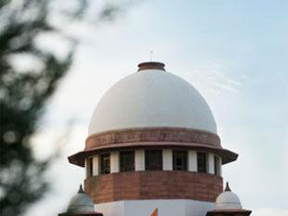 NEW DELHI: In a blow to gay rights activists, the Supreme Court today upheld the constitutional validity of the penal provision making gay sex an offence punishable with up to life imprisonment.
NEW DELHI: In a blow to gay rights activists, the Supreme Court today upheld the constitutional validity of the penal provision making gay sex an offence punishable with up to life imprisonment.
A bench of justices G S Singhvi and S J Mukhopadhaya set aside the Delhi High Court’s verdict which had in 2009 decriminalized gay sex among consenting adults in private.
The bench allowed the appeals filed by various social and religious organizations challenging the high court verdict on the ground that gay sex is against the cultural and religious values of the country.
The bench, however, put the ball in Parliament’s court to take a decision on the controversial issue, saying it is for the legislature to debate and decide on the matter.
With the apex court verdict, the operation of penal provision against gay sex has come into force.
As soon as the verdict was pronounced, gay activists in the court looked visibly upset. . The bench said Parliament is authorized to delete section 377 of IPC but till the time this penal provision is there, the court cannot legalize this kind of sexual relationship.
After pronouncement of the judgment, gay rights activists said they will seek review of the apex court’s verdict.
The court passed the order on a batch of petitions of anti-gay right activists and social and religious organizations against the high court’s verdict decriminalizing gay sex.
The bench had reserved its order in March last year after granting day-to-day hearing of the case from February 15, 2012.
While hearing the appeal, the apex court had pulled up the Centre for its “casual” approach on the issue of decriminalization of homosexuality and also expressed concern over Parliament not discussing such important matters and blaming judiciary instead for its “over-reach”.
While pleading for decriminalization of gay sex, the Centre had subsequently told the court that the anti-gay law in the country had resulted from British colonialism and Indian society was much more tolerant towards homosexuality.
The Delhi High Court had on July 2, 2009 decriminalized gay sex as provided in Section 377 of the Indian Penal Code (IPC) and had ruled that sex between two consenting adults in private would not be an offence.
Section 377 (unnatural offences) of IPC makes gay sex a criminal offence entailing punishment up to life imprisonment.
The petition seeking to decriminalize gay sex was filed in the high court by Naz Foundation.
Senior BJP leader B P Singhal, who died in October last year, had challenged the high court verdict in the apex court, saying such acts are illegal, immoral and against the ethos of the Indian culture.
Religious organizations like All India Muslim Personal Law Board, Utkal Christian Council and Apostolic Churches Alliance too had challenged the judgment.
The Delhi Commission for Protection of Child Right, Tamil Nadu Muslim Munn Kazhgam, SD Pritinidhi Sabha, Joint Action Council, Raza Academy, astrologer Suresh Kumar Kaushal, yoga guru Ramdev’s disciple S K Tijarawala, Ram Murti, Bhim Singh, B Krishna Bhat had also opposed the verdict.
The Centre had earlier informed the apex court that there are an estimated 25 lakh gay people and about seven per cent (1.75 lakh) of them are HIV-infected.
In its affidavit, the Union Health Ministry had said it was planning to bring four lakh high-risk ‘men who have sex with men (MSM)’ under its AIDS control program and it has already covered around two lakh of them.–PTI






